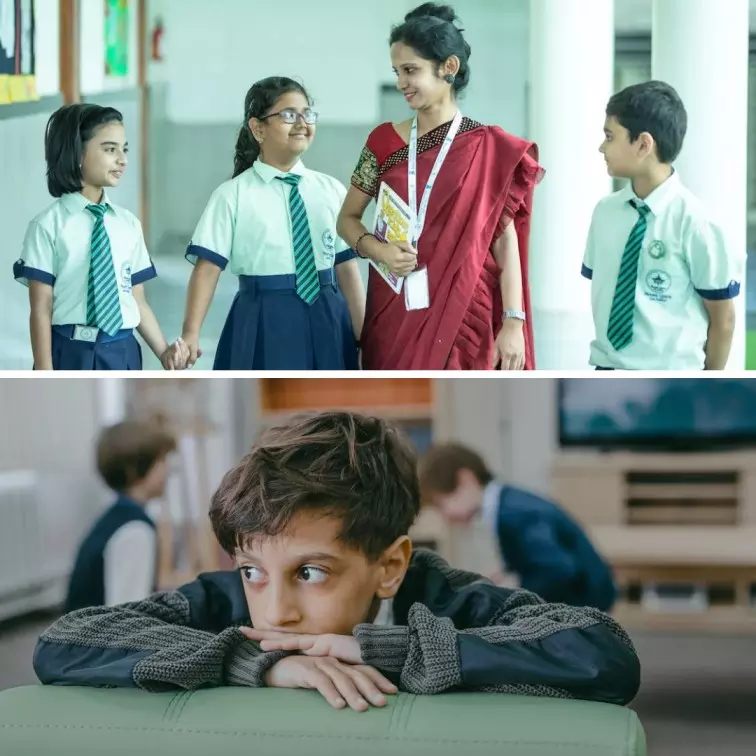A Growing Concern For Students: Corporal Punishment Common Practice In Schools Despite Laws
Writer: Deepthi Rao
She is a postgraduate student pursuing Multimedia Journalism at Christ Deemed to be University. She believes in the power of storytelling and truth. "Do it with passion or not at all."
India, 21 Dec 2022 6:17 AM GMT | Updated 21 Dec 2022 7:42 AM GMT
Editor : Jayali Wavhal |
She writes about gender issues, human interest, and environment.
Creatives : Jayali Wavhal
She writes about gender issues, human interest, and environment.
Section 17 under the Right to Education Act of 2009 bars corporal punishment on children. Yet, repeated incidents of teachers beating children, one where the student died after the teacher pushed him off the first-floor balcony, raise several concerns about the education system.
In a horrific event that was reported recently from Karnataka's Gadag district, a teacher beat up a Class 4 student with an iron rod, the reason for which still remains unknown. The teacher then pushed the student off the first-floor balcony of the government-run school, which resulted in the death of the child.
In another incident reported earlier this week, a school teacher in Delhi used paper-cutting scissors to hit a Class 5 girl and pushed her off the first floor. An incident from Pune had a teacher beat up a six-year-old student for allegedly having "bad handwriting".
Such incidents being reported from schools -- an institution which not only teaches children but also plays a huge role in their upbringing and keeping them safe -- has raised several concerns about the quality of teachers and their behaviour in India. It also poses an important question: Has India normalized beating children to discipline them?
Is Hitting Children 'Good Parenting'?
In Indian families, often, parents believe that hitting a child is an effective way of disciplining them. While speaking to The Logical Indian, Nirmala Joshi, a resident of Pune and mother of two said, "I know many people who have time and again resorted to slapping their child if the child is not listening or disobeying them. In our society, parents have not been taught that using physical force on a child is orally not correct. Instead, they have normalised it. So much, so that when parents are dropping their children off at school or for tuition, they ask the teacher to use force on their child if the child doesn't listen. They think it will help them yield better results, without taking into account how it might impact the child."
Lissy Thomas, a teacher from Bangalore, told The Logical Indian that besides teaching the syllabus, their job as teachers is to teach kids about kindness and empathy. "Hitting children gives the exact opposite message. Earlier, people resorted to these means; however, times are changing now, and people are standing up to this," said. She added that when she was a child, using force to discipline your child was seen as 'good parenting'. She questioned whether that belief exists now and said, "Even today, most guardians resort to beating their child. I don't see it as a way of teaching something to your child, but most people still do."
Hitting students leaves a severe impact on their psyche which can last for several years. Swapnesh Patra, a resident of Mumbai, while speaking to The Logical Indian, said, "I was hit by a teacher as a child for not doing my homework. It made me upset and angered me. Instead of helping me improve in academics, it made me want to avoid the teacher and the subject often."
Pooja Jaswani, who has worked on several projects dealing with child rights in India, told The Logical Indian, "While hitting (also known as Corporal punishment) is a punishable offence in India, it is still very prevalent in India. I'm absolutely gutted to learn a teacher did this (referring to the Karnataka incident) in a fit of rage to a fellow teacher's child on school premises. The fact that he even attempted this in the capacity of a teacher is appalling. From another lens, it can also be seen as a blatant abuse of power just by virtue of his position. Even in extreme cases of Corporal punishment, can we expect a 5 or 10-year child to defend?"
Jaswani highlighted the importance of sensitisation among children. She said, "With the rising cases of heinous crimes in the school environment, this calls for a larger investment in nationwide teacher sensitisation. It also demands making children aware of appropriate teacher conduct in school along with child rights sensitisation. This is a need for children, especially in the age group 5-10 years, who are unaware of how to protect themselves and lack the vocabulary to identify an act as abuse and report it to their parents."
Laws For Protecting Children
According to the Right to Education Act of 2009, corporal punishment is a form of 'physical punishment,' 'mental harassment,' and discrimination. According to the Guidelines for Eliminating Corporal Punishment in Schools by the National Commission for Protection of Child Rights (NCPCR), physical punishment is any act that results in pain, hurt/injury, or discomfort for a child, no matter how little. It includes slapping, kicking, pinching, hitting with an object (like a cane, chalk, or duster, among others), and making children assume uncomfortable positions - like kneeling, holding ears through legs, wall-chair position), among others.
Mental harassment is non-physical behaviour, but still harmful to a child's academic and psychological well-being. Examples include sarcasm, calling children names, derogatory adjectives, intimidating them, ridiculing or belittling them, and shaming them.
Section 17 under the Right to Education Act 2009 completely bars corporal punishment on children, and the sentence under Section 75 of the Juvenile Justice Act would be rigorous imprisonment of up to five years and a fine of up to Rs 5 lakh.
However, stringent laws alone do not ensure the safety of children in the educational institution that is school. A shift in the mindset of those who educate the children is needed too. Moreover, parents too must acknowledge that hitting children goes against several moral codes of conduct. Parents and students must be encouraged to report all cases of corporal punishment, no matter how small.
Until everyone who is associated with the upbringing of children does not take steps towards denormalising the practice of 'hitting children' to discipline them, the aforementioned laws might prove to be ineffective on their own.
 All section
All section














